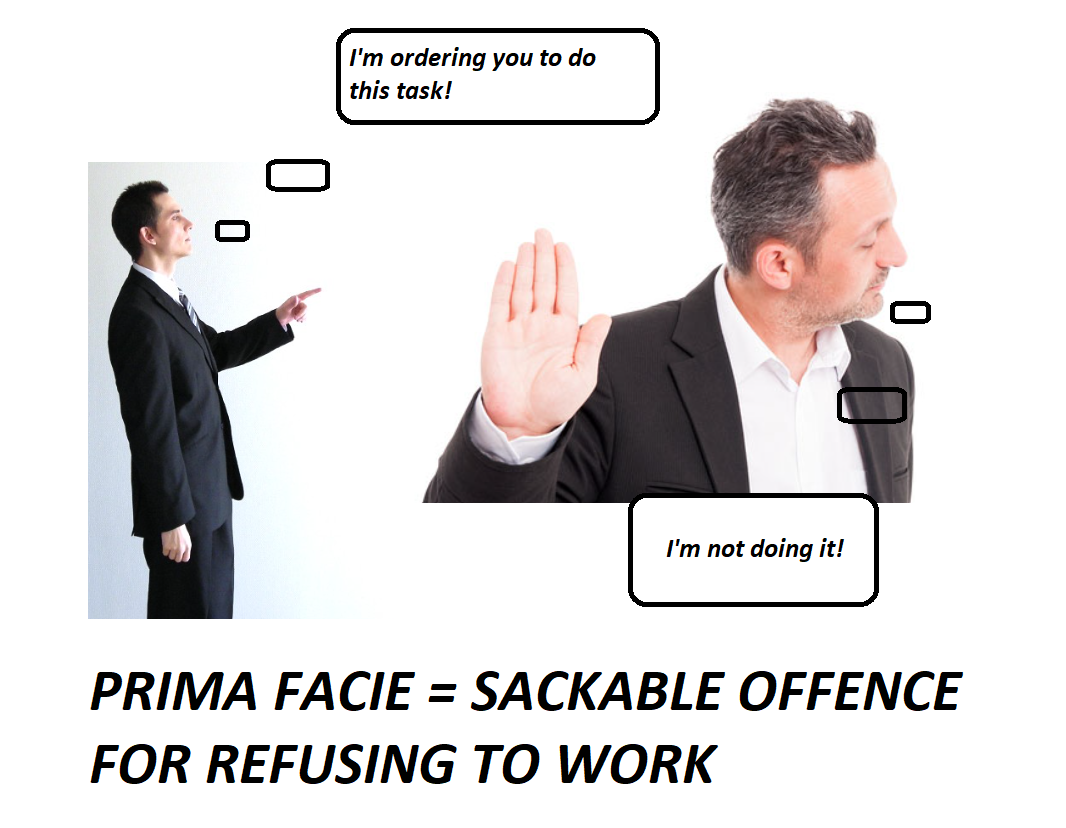Stock v Frank Jones (Tipton) Ltd. [1978] 1 WLR 231; [1978] All ER 948 H.L
Citation:Stock v Frank Jones (Tipton) Ltd. [1978] 1 WLR 231; [1978] All ER 948 H.L
Rule of thumb 1:Is an employee refusing to work a sackable offence? Yes, it is.
Rule of thumb 2:How are statutes to be interpreted? Statutes are to be interpreted logically & simply – the dictionary definition of words is to be taken and what the words mean is then to be applied – they have to be interpreted as the ordinary person would interpret them. This established an important foundational principle of legal methods. The Court held that first and foremost the ordinary definitions of words in statutes has to be taken when considering the statute’s meaning, and if these are clear, then no other primary or secondary sources are of any importance.
Judgment:
The Court in this case affirmed that an employee striking or refusing to work is a valid ground for dismissal of the employee, unless other employees also took part in it and they were not sacked, or, it was a valid industrial action done correctly by a trade union. It affirmed that an employee striking or refusing to work has to be done carefully and in accordance with the rule of law or else it is a sackable offence. The Court affirmed that where statutes are clearly written like this then they must be followed.

Ratio-decidendi:
‘In a society living under the rule of law, citizens are entitled to regulate their conduct according to what a statute has said, rather than by what it was meant to say, or by what it would have otherwise said if a newly considered situation had been envisaged… A court would only be justified in departing from the plain words of the statute were it satisfied that: (1) there is clear and gross balance of anomaly; (2) Parliament, the legislative promoters and the draftsman could not have envisaged such an anomaly, could not have been prepared to accept it in the interests of a supervening legislative objective; (3) the anomaly can be obviated without detriment to the legislative objective; (4) the language of the statute is susceptible of the modification required to obviate the anomaly… but it is essential to bear in mind what the court is doing. It is not declaring Parliament has said X, but it obviously meant Y, so we will take Y as the effect of the statute. Nor is it declaring Parliament has said X having situation A in mind, but if Parliament had had our own forensic situation B in mind, the legislative objective indicates that it would have said Y. So we will take Y as the effect of the statute as regards B. What the court is declaring is Parliament has used words which are capable of meaning either X or Y, although X may be the primary natural and ordinary meaning of the words, the purpose of the provision shows that the secondary sense, Y, should be given to the words. So, too, when X produces injustice, absurdity, anomaly or contradiction. The final task of construction is still, as always, to ascertain the meaning of what the draftsman has said rather than to ascertain what the draftsman meant to say. But if the draftsmanship is correct, these should coincide, so that if the words are capable of more than one meaning it is a perfectly legitimate intermediate step in construction to choose between potential meanings by various tests (statutory objective, justice, anomaly, etc) which throw light on what the draftsman meant to say’, Lord Simon
Warning: This is not professional legal advice. This is not professional legal education advice. Please obtain professional guidance before embarking on any legal course of action. This is just an interpretation of a Judgment by persons of legal insight & varying levels of legal specialism, experience & expertise. Please read the Judgment yourself and form your own interpretation of it with professional assistance.

